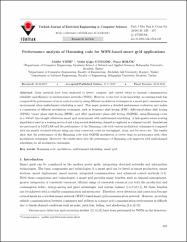| dc.contributor.author | Yigit, Melike | |
| dc.contributor.author | Gungor, Vehbi Cagri | |
| dc.contributor.author | Boluk, Pinar | |
| dc.date.accessioned | 2019-07-01T09:10:44Z | |
| dc.date.available | 2019-07-01T09:10:44Z | |
| dc.date.issued | 2018 | en_US |
| dc.identifier.citation | TURKISH JOURNAL OF ELECTRICAL ENGINEERING AND COMPUTER SCIENCES Volume: 26 Issue: 1 Pages: 125-137 DOI: 10.3906/elk-1704-238 | en_US |
| dc.identifier.issn | 1300-0632 | |
| dc.identifier.issn | eISSN: 1303-6203 | |
| dc.identifier.other | DOI: 10.3906/elk-1704-238 | |
| dc.identifier.other | Accession Number: WOS:000428721400012 | |
| dc.identifier.uri | http://acikerisim.agu.edu.tr/xmlui/handle/20.500.12573/56 | |
| dc.description | The work of VC Gungor was supported by the Abdullah Gul University Foundation and the Turkish National Academy of Sciences Distinguished Young Scientist Award Program (TUBA-GEBIP) (Grant No. V.G./TBA-GEBP/2013-14). | en_US |
| dc.description.abstract | Many methods have been employed to detect, compare, and correct errors to increase communication reliability and efficiency in wireless sensor networks (WSNs). However, to the best of our knowledge, no existing study has compared the performance of error control codes by using different modulation techniques in a smart grid communication environment when multichannel scheduling is used. This paper presents a detailed performance evaluation and makes a comparison of different modulation techniques, such as frequency shift keying (FSK), differential phase shift keying (DPSK), binary phase shift keying (BPSK), and offset quadrature phase-shift keying (OQPSK), using Hamming codes in a 500-kV line-of-sight substation smart grid environment with multichannel scheduling. A link-quality-aware routing algorithm is used as a routing protocol and a log-normal shadowing channel is employed as a channel model. Simulations are performed in MATLAB and the performance of the Hamming code with various modulation techniques is compared with the results obtained without using any error correction codes for throughput, delay, and bit error rate. The results show that the performance of the Hamming code with OQPSK modulation is better than its performance with other modulation techniques. Moreover, the results show that the performance of Hamming code improves with multichannel scheduling for all modulation techniques. | en_US |
| dc.description.sponsorship | Abdullah Gul University Foundation Turkish National Academy of Sciences Distinguished Young Scientist Award Program (TUBA-GEBIP) V.G./TBA-GEBP/2013-14 | en_US |
| dc.language.iso | eng | en_US |
| dc.publisher | TUBITAK SCIENTIFIC & TECHNICAL RESEARCH COUNCIL TURKEY, ATATURK BULVARI NO 221, KAVAKLIDERE, ANKARA, 00000, TURKEY | en_US |
| dc.relation.ispartofseries | TURKISH JOURNAL OF ELECTRICAL ENGINEERING AND COMPUTER SCIENCES;Volume: 26 Issue: 1 Pages: 125-137 | |
| dc.rights | info:eu-repo/semantics/openAccess | en_US |
| dc.subject | Hamming code | en_US |
| dc.subject | modulation | en_US |
| dc.subject | multichannel scheduling | en_US |
| dc.subject | smart grid | en_US |
| dc.title | Performance analysis of Hamming code for WSN-based smart grid applications | en_US |
| dc.type | article | en_US |
| dc.contributor.department | AGÜ, Mühendislik Fakültesi, Elektrik & Elektronik Mühendisliği Bölümü | en_US |
| dc.contributor.institutionauthor | | |
| dc.identifier.doi | 10.3906/elk-1704-238 | |
| dc.relation.publicationcategory | Makale - Uluslararası Hakemli Dergi - Kurum Öğretim Elemanı | en_US |


















